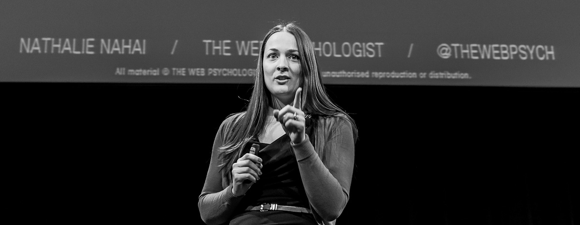Web psychology consists of a lot of different factors.
You can think of, neuroscience, behavioral economics, human-computer interaction, cognitive psychology, cross-cultural psychology, user experience, social psychology, neuroaesthetics.

Nathalie Nahai shared insights and examples with the audience at The Social Conference. One of the most interesting presentations that day in Amsterdam.
Why Social Media?
Our psychological needs:
- Satisfies our deep-seated desire for connection & communication
- Helps us measure the intimacy and influence index of our relationships
- For many it has become key to self-esteem
From global studies (students and young employees) it is clear that 56% would refuse to work for a company that banned access to social media. For 24% access to social media would actually be a deciding factor in accepting a job.
Social Media in organisations:
- Can engender a sense of belonging.
- It’s use (or lack thereof) can reflect and change an organanisation’s culture.
But there are also risks for social media in organisations:
- Lack of controllability – difficult to monitor and manage
- Transparency & accountability – it’s a two-way conversation
- Flatter structure – can result in power shifts
Nathalie shares an example of the American Red Cross that things can go wrong. A personal tweet on the company account in Hootsuite. The American Red Cross responded in a good way, with humor. It is important to have a strategy in place when something goes wrong.
More sales with social media: Dell
Then Nathalie shows the example of Dell, on how social media can contribute on the sales. In 2009 they already generated $ 7 million in revenue through Twitter (USA).
Since 2006 Dell’s online community has grown to 3.5 million people world wide.
The social media strategy of Dell is very straight forward and easy to understand:
Connect –> Converse –> Convert.
Activate new fans: Corona
The Corona case Nathalie shared, shows how easy it is to get more people engaging with your brand. By Liking the page and uploading a photo, your photo was shown on a giant billboard in Times Square.
How did they use applied psychology to create such a successful campaign?
- Social validation: develop meaningful social relationships, and retain a favourable self-concept.
- Reciprocity: The fan (5 minutes of fame, or more like 3 sec.), Corona Light (new fans, viral promotions, WOM buzz, demographic information, long-term advocacy). Not very equal sharing, but smart.
- Social Proof: Global reach: millions of Facebook users, 6000% increase in number of Likes in 30 days, and access to over 300,000 Likes.
The key takeaways
- We (humans) are hard wired to be social
- We rely on our relationships to helps us make decisions
- You can use psychological principles to engage with and influence your audience (see also the books and research of Cialdini).
Psychology that works in sales and helps you to sell more
Scarcity principle – have a limites quantity or a limited time for the sale for example.
Nathalie also explains the loss aversion and endowment effect at the end of the video. See how this can help you to sell more or make people pay more for your product.
Video of the presentation
Like most of the presentations I try to record it. It is done with a small camera, the sound is OK, but you will have to turn up the volume a bit. Sometimes the image shakes a bit, that is me writing the blog post while Nathalie speaks.
Watch the video of the presentation by Nathalie Nahai on Web psychology:
Slides of the presentation
Find below the slides of the TSC13- Nathalie Nahai – The Web Psycologist – Web Psychology Your roadmap to online succes:
Personal Note from Nathalie
A personal note from Nathalie for you in this video:
Read more of The Web Psychologist
http://www.thewebpsychologist.com/
http://www.slideshare.net/nathalienahai
Get her book that has three interesting parts:
- Know who you’re targeting
- Communicate Persuasively
- Sell with Integrity
Her book Webs of Influence: The Psychology of Online Persuasion (aff)
Credit photo: Bibi Veth Visual Storytelling
Your online success
Can you see how you can use web psychology for your online success?